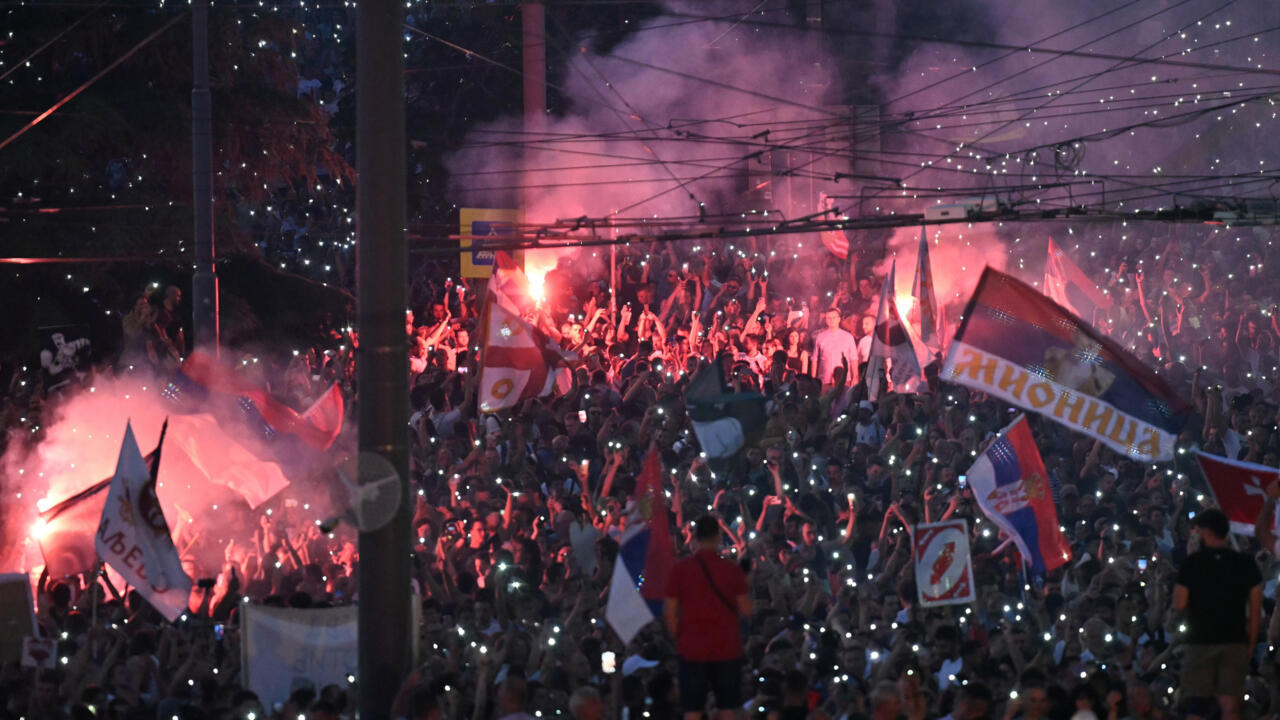Articles in this Cluster
29-06-2025
Serbian police clashed with around 140,000 anti-government protesters in Belgrade, demanding early elections and an end to President Aleksandar Vucic's 12-year rule. Dozens were arrested and riot police used tear gas and stun grenades. Vucic accused the protesters of being part of a foreign plot, while the police minister condemned the violence and vowed to arrest those responsible. The protests, led by students and joined by various groups, have been ongoing since December, driven by grievances over corruption and the government's response to a deadly accident.
29-06-2025
Around 140,000 protesters rallied in Belgrade, Serbia, demanding the populist government hold early elections, with clashes erupting between demonstrators and riot police. The protest was one of the largest in over half a year of student-led actions, which began after a train station collapsed in November, killing 16 people. The students have been demanding a transparent investigation into the tragedy and justice for the victims, blaming government ineptitude and corruption. Police used tear gas and stun grenades, while protesters hurled flares, resulting in dozens of detentions and injuries. The government has rejected the demand for early elections, with President Aleksandar Vucic claiming the protests are part of a foreign plot to destroy his government.
29-06-2025
Riot police clashed with tens of thousands of anti-government protesters in Belgrade, Serbia, who were calling for snap elections and an end to President Aleksandar Vucic's 12-year rule. The protesters, largely led by university students, chanted "We want elections!" and declared the current authorities illegitimate. Police fired tear gas to disperse the crowds, and skirmishes lasted for several hours, resulting in the detention of several dozen protesters and six injured officers. Vucic responded to the violence by stating "Serbia always wins in the end." The protests, which began after a fatal incident in November, have been ongoing for nearly eight months, with demonstrators accusing Vucic's government of corruption and authoritarianism.
29-06-2025
Thousands attended Budapest Pride, a significant increase from last year's attendance, in a clear message to Prime Minister Viktor Orban, whose government attempted to ban the event. The ban was based on a new law that equated homosexuality with paedophilia, but the mayor of Budapest cited a 2001 law allowing the event to proceed. The march turned into a celebration of human rights and solidarity, with many banners and T-shirts mocking Orban, and attendees included politicians and activists from across Europe. Despite the police presence being largely restrained, the government warned of potential fines for participants and vowed to revisit the legislation depending on the court's decision regarding the event's legality.
29-06-2025
Tens of thousands of LGBTQ Hungarians and their supporters marched in Budapest's Pride parade, defying a government ban and Prime Minister Viktor Orbán's legal threats against activists. The 30th edition of the march drew over 100,000 people, who protested against a law that makes it an offense to hold or attend events that "depict or promote" homosexuality to minors under 18. The law, fast-tracked by Orbán's populist party, also allows authorities to use facial recognition tools to identify attendees, with potential fines of up to $586 and prison time for organizers. Despite the threats, participants remained defiant, with many expressing their desire for a country that values diversity and equality. The march was attended by European officials, including European Commissioner Hadja Lahbib, who condemned the government's ban as "intolerable."
29-06-2025
Thousands of people defied a government ban to attend a Pride march in Budapest, Hungary, despite warnings of a 500 euro fine and the use of facial recognition cameras to identify attendees. The march, which was the 30th to be held in the city, drew huge crowds who celebrated LGBTQ+ rights and defied the government's attempt to cancel the event. The ban was part of a wider crackdown on LGBTQ+ communities by Viktor Orban's government, which has pitched family values against LGBTQ+ rights. Attendees, including those from Poland, said they were willing to take the risk of being fined to show their support for the community, with many believing the march was about the future of Hungary and its commitment to democracy and freedom.
